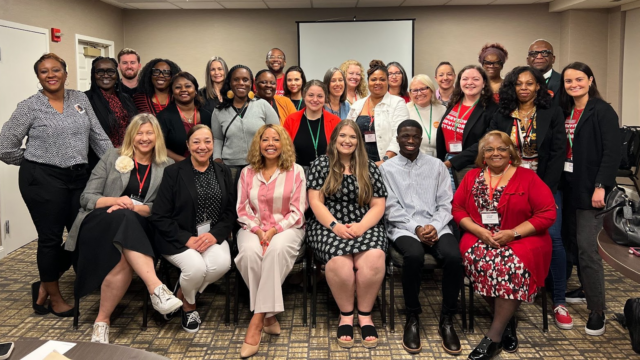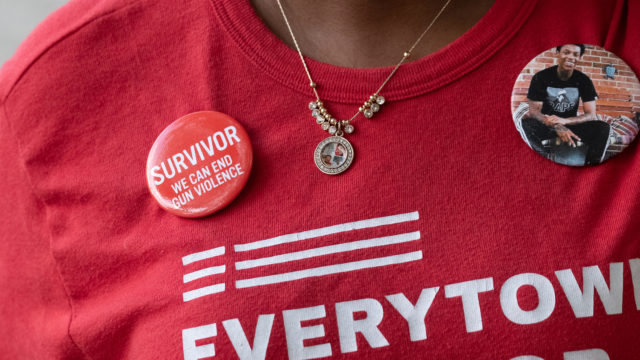Everytown Survivor Fellowship Program

About the Program
AT EVERYTOWN, WE BELIEVE THAT YOUR STORY HAS POWER.
Here at Everytown for Gun Safety, we believe in the power of elevating the voices of those who have a lived experience with gun violence and know firsthand the long-lasting implications for communities, families, and individuals. In an age where facts are traded for hot takes and clickbait, first-person narrative storytelling remains the strongest method of changing hearts and minds.
In recognition of the importance of putting a human face to the numbers and allowing those with lived experience to advocate for change, in 2015, the Everytown for Gun Safety Support Fund launched the Survivor Fellowship Program, a one-year volunteer advocacy training program for people affected by all types of gun violence who are interested in sharing their story with community groups, elected officials, and the media to raise awareness and motivate people to take action to end gun violence across the nation. The program opens applications once a year.
In addition to educational leadership and advocacy training, the program strives to build a community of advocates and provides opportunities to exchange ideas and learn from one another. Fellows who successfully complete the annual program requirements by December 31 of their first year in the program will be invited to continue for a second year.
Who is Eligible to Apply?
A Fellowship Program applicant must be:
- At least 18 years old;
- Personally impacted by gun violence (or any kind)
The Everytown Survivor Fellowship Program is exclusively open to individuals who have been personally impacted by gun violence of any kind, whether they have witnessed an act of gun violence, been threatened or wounded with a gun, or had someone they know or care for wounded or killed with a gun. This can include but is not limited to gun homicides (solved and unsolved), gun suicides, community gun violence, police shootings, domestic violence involving a gun, and unintentional shootings of improperly stored guns.
Any individual 18 years or older who identifies as having a personal experience with gun violence of any kind is welcome to apply. Interested high school, college/university, and graduate school students should apply to the Students Demand Action Fellowship Program.
We recognize that deciding to share your lived experience with gun violence is a deeply personal choice and may not be right for everyone. Sharing your story is one of many ways someone can make a difference in the gun violence prevention movement. If you are new to sharing your story and would like to learn more about whether sharing in this context would be a good fit for you, we encourage folks to take this self assessment to determine your comfort level and visit our website Moments That Survive to read the stories of survivors in their own words.
What Are the Program Expectations?
Following an application and interview, Survivor Fellows will complete a series of virtual onboarding training sessions on speaking before local community groups, effective story-sharing, testifying on common-sense gun laws, participating in media interviews, and more.
During their one-year tenure in the program, Survivor Fellows act as leaders in both the Everytown Survivor Network and their state and/or local Moms Demand Action Chapter and will be expected to find, share, and report out on five story-sharing engagements over the course of the calendar year. In doing so, they harness the power of their training and share their experiences with gun violence in a trauma-informed way to motivate others to take action in the fight to end gun violence.
A story-sharing engagement is defined as an instance where a Survivor or Student Survivor Fellow shares their story with the purpose of engaging the audience in the fight to end gun violence as a messenger of the Everytown Survivor Network. Engagements should contain all of the following criteria in order to be accepted as a submission and qualify toward a Fellow’s annual story-sharing goal and can be either in-person, virtually, or via print or digital publication:
- Ensure messaging is in alignment with Everytown values and policy positions
- Share remarks in advance for Everytown support and guidance, if requested, and required for legislative testimony
- An audience of at least 10 people (unless you are meeting with an elected official or a member of the media for an interview)
- Engage the audience in a call to action
- Submit to the story-sharing submission form no later than the 10th of the following month
Fellows who aren’t able to complete the annual program requirements by December 31 of their first year in the program will not be eligible to continue in the program for another year.
Survivor Fellows who have successfully completed the annual program requirements by December 31 have two options at the end of the year:
- Possibly be offered the opportunity to recommit to another year as a Fellow
- Exit the program. Please note there are still options for non-Fellows in the Everytown Survivor Network to potentially share their story.
Summary of Program Expectations
In addition to virtual foundational training, Fellows will be expected to complete the following in their first year:
- Find, share, and report out on at least five story-sharing engagements (reporting no later than the 10th of the following calendar month)
- Attend at least three of four Quarterly Fellowship program calls live (1 hour each)
- Commit to building a diverse, equitable, inclusive, and accessible community of people in order to build a strong movement
- Agree to develop and implement skills to effectively work across lines of difference
All Fellows Receive:
- Ongoing training and programmatic support from Fellowship staff
- Access to training materials, toolkits, policy briefings, updates, and guidance from experts in the field
- Opportunities to connect virtually with other survivors to exchange knowledge and best practices
Program Qualifications
Everytown welcomes a diverse group of volunteers with all kinds of lived experiences and political beliefs. However, our fellows unite on the following:
- Must be at least 18 years old
- Must have been personally affected by gun violence, including, but not necessarily limited to, having witnessed an act of gun violence, been threatened or wounded with a gun, or had someone you cared for wounded or killed with a gun
- Willingness to commit to finding your own story-sharing engagements and sharing your experience with gun violence
- Willingness to learn from peers and share experiences with other survivors both in the Fellowship Program and those interested in advocacy
- Willingness to develop a personal self-care plan to ensure that you are engaging in self-care while sharing your story
- A completed application and letter of recommendation from your Moms Demand Action chapter and/or another community leader.
How Do I Apply?
The Fellowship Program accepts applications once per year and the application is open for one month. This year’s application period is now over. Check back on this page in 2026 for more updates on when we will begin accepting applications for the 2027 cohort.
Here are example steps how to apply once applications are live:
1. Fill out the application. It should take approximately 20-30 minutes to complete.
2. Have a member of your community or someone with whom you’ve worked closely send us a brief letter of recommendation about why they would be a good fit for this program by emailing us at [email protected]. Please ask them to include your name and reference the 2026 Fellowship Application in the subject line. We also ask the recommender to cc the applicant onto the e-mail, because it is the applicant’s responsibility to ensure that the letter of recommendation is received prior to the close of the application process. Unfortunately, we are unable to extend the deadline of the application.
After the application window closes, Fellowship Program staff will respond within a 48-hour period via email to schedule Zoom interviews with those who meet the program qualifications and requirements. Following the interview, applicants will be informed if they will advance to the foundational training.
Please note that this application process includes a background check. However, background check results may not necessarily prohibit applicants from becoming Fellows.
After completing all of the necessary steps stated above, the Fellowship Program staff will review each candidate’s eligibility for acceptance into the Program.
If you have any questions about the program or the application process, please e-mail [email protected]. A member of the Fellowship Team will get back to you within 48 hours.
Conflict of Interest Policy
Fellows are a public face and voice for the Everytown Survivor Network and Moms Demand Action chapter in their respective state/area. Accordingly, applicants must disclose their involvement with other gun violence prevention organizations or with organizations whose missions or activities may be inconsistent with that of Everytown and Moms Demand Action.
Fellows may not hold a paid leadership, lobbying, or public role within another Gun Violence Prevention (GVP) organization, or with any organization whose mission or activities are inconsistent with that of Everytown/Moms Demand Action.
Everytown staff will consider on a case-by-case basis other potential conflicts of interest, including volunteer leadership roles in other GVP groups or public activity in their personal capacity on a GVP issue that is outside the Everytown/Moms Demand Action policy framework.
Program Note
We are committed to seeking diverse experiences that tell the full story of daily gun violence in America, beyond what typically makes the headlines. Priority will be given to those who have demonstrated a commitment to proactively identifying opportunities to share their story, and are interested in further developing their public speaking and communication skills. Based upon our experience and feedback from past Fellows, those who are most successful in this program have had prior experience sharing their story with family and friends or speaking to local organizations, are comfortable taking the initiative to approach organizations and share their story with different audiences, and have a plan to sustain their emotional health and well-being, including an existing network of support. For those interested in developing their story-sharing skills but are not yet looking to make the level of commitment required by the Fellowship program, there are additional training tools and resources available through the Everytown Survivor Network.
For some survivors, sharing their personal experiences with gun violence can range from deeply rewarding to potentially re-traumatizing. We believe your health and wellness is paramount to taking on any type of leadership and public role in this movement. While Everytown is committed to creating a community of support for survivors and many survivors describe connecting with other survivors and their advocacy work as emotionally healing, the organization does not offer direct services such as counseling, financial support, or legal assistance. Your involvement, if you choose to partner with us, requires that you have a personal plan and network of support to sustain your emotional well-being.
Who We Are
About the Everytown Survivor Network

- Understanding how stereotypes, bias, and forms of racism in America (including structural racism, implicit bias, gender bias, religious bias, and bias based on gender identity or sexual orientation) impact our society and an ability to articulate the connection between these large societal issues and the disproportionate impact of gun violence on specific demographic groups in America.
- Understanding how dynamics of power, voice, and privilege impact one-on-one and group interactions, and a commitment to using power, voice, and privilege to make our movement more equitable.
- A commitment to share direct feedback with others and listen to and implement feedback given.
- Commitment to building diverse teams and learning management skills for equity and inclusion.
- Ability to help other people in our movement develop this same skill set and knowledge base. As with all other organizing skills the expectation is that over time leaders would also develop the ability to train other volunteers in these areas.

